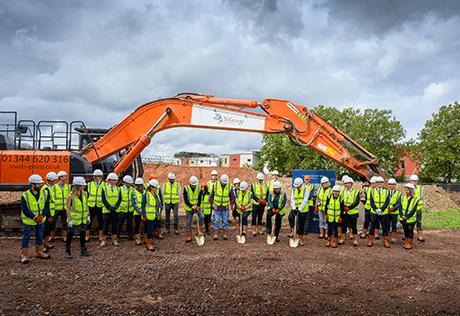Environmental Management
0
environmental prosecutions in 23/24
14.6/15
Berkeley's average score for the CCS Environmental section
89%
average score for the internal site sustainability assessment
We have developed a robust framework to identify, understand and manage the environmental issues on and around our construction sites as well as the legal requirements that we must adhere to.
Environmental risks are managed by a site-specific environmental risk register, and prevention and mitigation measures are discussed and agreed with our contractors. Our local sustainability teams also undertake regular checks and quarterly audits to ensure sites meet the required environmental management standards.
Sustainability Management System
Procedures and standards are regularly reviewed to ensure they are up to date to meet regulations as well as requirements set out by our internal policies. Procedures and standards are also shared with our contractors prior to them commencing on site. Contractors are required to sign up to our Sustainability Standard for Contractors and provide evidence of how the can support Berkeley in achieving continuous improvements and best environmental management practices on site.
This approach and our focus on environmental management on site has contributed to our sites’ achieving an average score of 14.6 in the ‘Care for the Environment’ section of the Considerate Constructors Scheme, compared to an industry average of 13.2.

Environmental Assessment Process

Our assessment scoring system allows us to more readily compare sites across the Group. The assessment considers various performance indicators (such as waste and resource management, pollution prevention, energy and water efficiency, and nuisance) and generates an overall score, thus providing a simple way of understanding how each live site is performing. This allows project managers to identify areas for improvement and encourages them to strive for excellence in order to be above the Group average. The system also helps identify projects that have been innovative or have been able to significantly improve their score over time, and those requiring additional training or support.
Environmental Incidents and Near Misses
Berkeley is committed to achieving zero significant or major incidents per year. Anything that causes harm beyond a small localised area of site or causing environmental consequences or nuisance beyond the site boundary would be classified as significant or major incident, depending on the extent of the impact on the environment or neighbours. We implement processes and measures to meet this target, including incident preparedness and response training to our staff and contractors, as well as rigorous checks of the pollution prevention controls and response plans in place on site as part of our regular sustainability assessments.
We have created an intervention app to provide an easy way for our teams to report any near misses or potential issues. Our workforce can anonymously log an issue using a phone or tablet by scanning a QR code on posters around the site. The app allows the team to record positive recognition interventions as well as corrective ones, which can help identify trends in both Health & Safety and Environmental Management practices on site as well as areas that require upskilling and focus.
If an incident does occur, the causes are investigated and the lessons learnt are reviewed and shared across Berkeley to reduce the likelihood of reoccurrence.